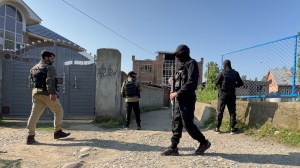‘What unfolded that night was a sequence of systematic failures’: Students write to V-C after RGNUL Patiala student dies of cardiac arrest
On Friday, in a letter mailed to the university vice-chancellor, registrar, and other officials concerned, the RGNUL Student Bar Council flagged lapses that led to the tragedy.
 The detailed email indicated that even as Udita’s friends made frantic phone calls to the people concerned late on Wednesday, they did not receive any immediate help.
The detailed email indicated that even as Udita’s friends made frantic phone calls to the people concerned late on Wednesday, they did not receive any immediate help.
Two days after a woman student died of a “cardiac arrest” on the Rajiv Gandhi National University of Law (RGNUL) campus in Patiala late on Wednesday, her fellow students alleged “systematic failure” and “gross administrative negligence” in medical assistance.
A fifth-year law student, 23-year-old Udita at the university, was taken to a local hospital after she suffered “cardiac arrest” inside the hostel, but was declared dead on arrival, police said, citing the initial probe. An autopsy was conducted and the body of Udita, who was a native of Haryana, was handed over to her family, police said.
According to Udita’s fellow students, she was allegedly “not provided emergency medication” and “nobody really responded to the medical emergency” despite frantic phone calls being made to the authorities concerned — from the warden to the health centre — causing “inexplicable delay” in reaching the hospital.
The university ambulance had also arrived after over 30 minutes, they alleged.
On Friday, in a letter mailed to the university vice-chancellor, registrar, and other officials concerned, the RGNUL Student Bar Council flagged lapses that led to the tragedy.
“What unfolded that night (late on Wednesday) in response to the medical emergency, was a sequence of systemic failures, gross negligence, and lack of preparedness in providing timely medical aid,” the Council wrote, adding “the series of events was putting on record” — as narrated by students who had responded to the medical emergency that night.
The detailed email indicated that even as Udita’s friends made frantic phone calls to the people concerned late on Wednesday, they did not receive any immediate help.
Alleging that “no staffer or doctor was available for emergency aid at the university’s internal medical centre” — which they termed a “usual affair every day after 10 pm” — the email read: “Her medical distress was first noticed around 10:45 pm.
Immediate efforts were made by the students to seek medical assistance — phone calls made to the health centre went unanswered. Despite being informed about the situation immediately, the warden arrived much later. Another faculty member, who contacted multiple times, also confirmed that the health centre had not been responding to her phone calls either.”
The male attendant of the health centre, who was also contacted for assistance, had refused to come, saying “he was not allowed to enter the women’ hostel premises — even in a life-threatening emergency”. This had cost further critical minutes, it alleged.
The students’ body further wrote in the email: “The students had requested for the university ambulance. However, the driver was not available, leading to a significant delay.
In the absence of any support from the administration and the health centre, the students were forced to cover her in bedsheets, while carrying her downstairs from the third floor. A wheelchair required to carry her further was even unavailable as it was kept in the storeroom, which was locked that time; the guards too could not find the keys.”
“…Only one woman guard had tried to help the students, but no assistance was provided by the administration or the health centre. A student was immediately sent to the health centre, as advised by the above-mentioned faculty member, however, the ambulance driver was found sitting idle near the health centre,” they alleged in the letter.
The ambulance arrived after nearly 30 minutes and started for the hospital even 10 minutes later, but it was completely ill-equipped — oxygen equipment was non-functional, stretcher was unretractable, and the attendant did not even assist in checking the 23-year-old’s pulse or lifting her,” they said.
“Udita had died by the time she reached the hospital,” the letter read.
Demanding accountability for this tragedy, and the implementation of immediate measures to avoid similar tragedies in the future, the Council asserted: “In the past too, the administration had been requested several times to fix these issues, however, there has been no upgrades on the campus… We urge the administration not to deflect blame, but to own responsibility for this loss, and act decisively so that no more lives are endangered.”
Dr Tanya Mander, officiating registrar of RGNUL, said: “We have received the email. We understand their pain of losing a fellow student… We are, however, still in the process of compiling the timeline of all that happened during those hours. We have requested the students to give us time, until Tuesday (May 27), so that we could act on the matter… As per the information we have, the university ambulance left the campus with the student within 15 minutes after her collapse. We are now verifying the students’ claims.”













